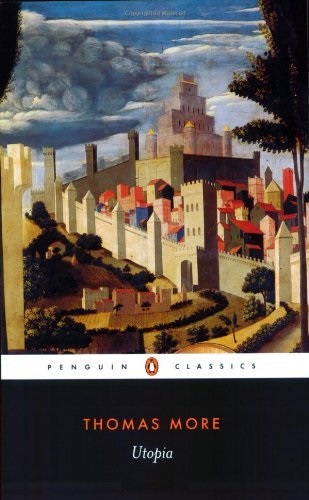Something about finding progressive values in really old pieces of work always puts a smile on my face. It can be a reminder that what may be considered new and radical today, has probably actually been around for hundreds, if not thousands of years. Utopia is a great book for this kind of thing, though it does have its fair share of dodgy beliefs thrown in too.
The book is written as if it were a piece of non-fiction. Writing as himself, Thomas More describes the circumstances in which he came into contact with a man named Raphael Hythlodaeus. At first they discuss many of the ills of their society (for example, talking about how severe punishments for thieves won’t stop the crime, when it’s largely caused by poverty, which is just as relevant now as ever), before getting to the really interesting bit: Raphael’s home region of Utopia.
One of the most interesting features of Utopia is that it is a communist society. Though the country has money for use in its international relationships, it has none for its citizens, who have all their needs provided for, and can access any additional materials from public storage buildings that anybody can access. I was particularly fascinated by the argument made by Raphael that the concept of money and ownership is inconsistent with the teachings of Jesus.
It also has a comical aspect to it, talking about how gold and jewels are given to people as punishments and considered shameful things, to discourage people from coveting them. That then leads to wealthy people from other countries to come and visit and be considered a laughing stock for looking so ridiculous (in the eyes of the Utopians) in their splendour. I liked that there was a sense of humour too it. The dialogues near the start can be quite witty as well, and there are jokes about not remembering where Raphael said Utopia was.
Another aspect that I liked was the notion of religious tolerance – something that was definitely not a mainstream view at the time. In Utopia, all religions are seen as different paths to an overall God – another belief which, even today, a lot of people would do well to adopt. Unfortunately, the religious tolerance does not extend towards those who do not have religious beliefs, and the atheists in Utopian society are second class citizens.
Speaking of the negative aspects of this society, it also places huge restrictions on the citizens’ sex lives, with pre-marital sex forbidden, and enforced life-long celibacy used as the punishment. Meanwhile, if you commit adultery, you’re forced to become a slave. And while this society does have slavery, which isn’t great, at very least, in Utopia, it’s a temporary state of being (usually a punishment) and people have the opportunity to gain their freedom again afterwards.
Citizens also need to have permission from the government if they are going to go anywhere, though he says that they all like it so much, they never want to go anywhere anyway – but would that ever really happen? Then there’s also the fact that people of certain jobs all have to dress in the same way. Women are allowed to have all the same jobs as men, yet are still expected to take care of all the housework. Of course, same sex relationships aren’t acknowledged at all. There’s no denying that Utopia has its list of flaws.
The whole book is a strange mixture of really cool, progressive ideas, and really awful ideas that sound like they’d make people miserable. For me, the progressive ideas shine so brightly, and are so impressive for their time, that it makes me like the book a lot overall – though, of course, you may find yourself less willing to focus on the positives. I reckon everyone should give it a go, and it’s written in quite a nice style (or at least, the Paul Turner translation is, anyway).
Rating: 9.1/10

